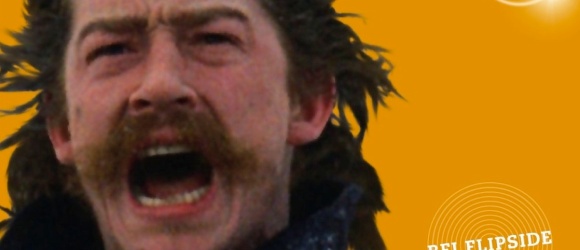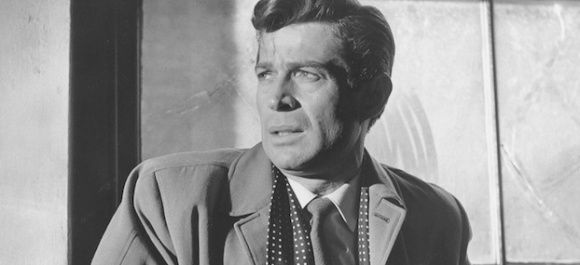
George Nader as Paul Gregory in Nowhere to Go
It’s buildings may still be in use, housing productions such as Downton Abbey and the upcoming Bridget Jones’ Baby, but it’s fair to say that Ealing Studios heyday was back in the 1940s, when its output included titles such as Whisky Galore! (1949) and Kind Hearts and Coronets (1949) and The Man in the White Suit (1951).
Numerous films from the Ealing archive have found there way to DVD and Blu-ray in recent years, with rarer titles finally being awarded pride of place on collectors’ shelves, while a major celebration at London’s BFI in 2012 raised awareness of its output even more.
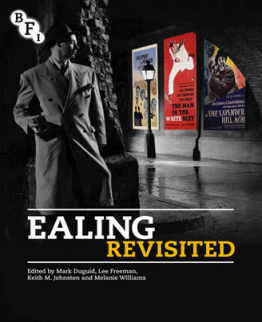 Over the last few months I’ve been trying to brush up on my Ealing, starting with one piece of lasting evidence from the BFI season, Ealing Revisited. The book aims to reassess the studio, its films and its people through a number of essays curated by editor Mark Duguid.
Over the last few months I’ve been trying to brush up on my Ealing, starting with one piece of lasting evidence from the BFI season, Ealing Revisited. The book aims to reassess the studio, its films and its people through a number of essays curated by editor Mark Duguid.
Beginning with George Formby and Gracie Fields’ films which were made at Ealing but which could hardly be called “Ealing films”, the book takes us through the studio’s formative years as Michael Balcon took over as studio head and things started to take shape behind and in front of the cameras.
Whether you’re interested in the people behind Ealing’s promotional material, costumes, scripts or actors, Ealing Revisited wends its way through the years offering insight into the success and failures of each.
Joseph Botting’s take on Ealing’s more fantastical films and Andrew Moor’s look at “queerness” in films such as Kind Hearts and Coronets widens the discussion from the standard topics, though there’s still much to find of interest in chapters such as Catherine A Surowiec’s look at Anthony Mendelson’s costume designs.
Surowiec notes that expensive ballgowns were just as likely to feature in an Ealing film as a Cockney spiv’s wide lapelled suit or a working man’s bunnet.
Don’t expect an exhaustive encyclopaedia of Ealing as some films receive a sentence or two if they’re lucky. While the regular change in contributor between essays does mean there’s little continuity in style, the end result is still a fascinating overview of the inner working of Ealing which may lead readers to head off in search of more in-depth books on the subject, or at the very least some of the films themselves.
Two such titles recently made it to DVD from StudioCanal, namely Nowhere to Go (1958) and Dance Hall (1950), the former set in a London of low morals and high crime rates while the latter looks at the love lives of young people shortly after the war.
 Adapted from Donald Mackenzie’s novel and scripted by film critic Kenneth Tynan, Nowhere to Go stars George Nader as Paul Gregory, a smarter-than-most thief who has back-up plans for back-up plans but who one day finds his luck running out.
Adapted from Donald Mackenzie’s novel and scripted by film critic Kenneth Tynan, Nowhere to Go stars George Nader as Paul Gregory, a smarter-than-most thief who has back-up plans for back-up plans but who one day finds his luck running out.
When he’s broken out of prison by accomplice Sloane (Bernard Lee), Gregory sets about retrieving the cash he hid from the police a few years earlier, only for his world to spin out of control.
Eschewing the perceived characteristics of a typical Ealing – a cosy community, the little man against the odds – Nowhere to Go instead borrows heavily from film noir as Gregory attempts to see his plan to the bitter end.
With fine support from Lee and a young Maggie Smith as his potential love interest, Nowhere to Go may not quite be a classic British thriller but it’s a welcome return for a film which has been, like Gregory, out in the cold for too long.
Another exhumation from the vaults is Dance Hall, director Charles Crichton’s diversion from the Ealing norm which focussed on the relationships of a group of young woman whose main link is their love of the local Palais.
The cast includes Natasha Parry and Petula Clark as Eve and Georgie, two dance hall regulars with personal issues that affect their leisure time. While Eve’s husband (Donald Houston) doesn’t want his wife dancing with other men (namely Bonar Colleano’s Alec), Georgie must try to convince her parents that she can triumph in a dance competition.
Though some other stories are weaved into the story, including that of Diana Dors who shines in a smaller role, it’s not a film which encourages much emotional investment from the viewer. Dance Hall does depict the era well, a time when women were about to be given more opportunities in the workplace, meaning it’s a valuable snapshot of a Britain fast disappearing.
 More lesser-known Ealing films are about to be released into the world with the release of Network’s Ealing Rarities Collection Volume 1, a collection of four titles on two discs which are rarely discussed in overviews of the studios output.
More lesser-known Ealing films are about to be released into the world with the release of Network’s Ealing Rarities Collection Volume 1, a collection of four titles on two discs which are rarely discussed in overviews of the studios output.
Basil Dean’s Escape! (1930) is the tale of a toff (Gerald du Maurier) who is imprisoned in Dartmoor following the death of a policeman, only to find himself on the run across the moors when the opportunity arises. Harry Watt’s West of Zanzibar (1954) finds the white man interfering in the lives of native Africans as Bob Payton (Anthony Steel) doles out advice to anyone who’ll listen.
A young Betty Driver, many years away from The Rover’s Return, stars in 1938’s Penny Paradise from director Carol Reed, a slight tale of tugboat captain Joe Higgins (Edmund Gwenn) who believes he’s won the pools and the reaction from those around him to his news. Finally, 1936’s Cheer Up! is from director Leo Mittler and finds two hapless composers trying to drum up support for their work, with hilarious consequences.
Of the four films, Penny Paradise is perhaps the most Ealing-like, with typical working class folk muddling through and helping each other when the going gets tough. Escape! is very much of its time, a slow and stagey production which is nevertheless an important example of post-silent era filmmaking as actors and crew find their feet.
With its location filming giving it a much needed gloss, West of Zanzibar stands out on this set as the only colour production. It also stands out because it’s the film that says the most about the time it was made, with Bob Payton seemingly a saviour of the black man in their own country. The problems caused by colonialism were never likely to be overtly stated by a British film of the era, meaning there’s something rather uncomfortable about the whole thing, even if one does try to take it as simply an adventure film.
Finally, Cheer Up! takes Ealing off into another direction entirely, with song and dance routines liberally sprinkled through the film, coming across like a kind of extended Morecambe and Wise sketch at times.
These four releases have been bundled together into a low-cost package designed to appeal to the completist and Network should be applauded for their efforts. While it’s only fair that Ealing’s higher quality ventures are remembered fondly, it’s difficult to put them into their proper context without books such as Ealing Revisited or titles such as these.
Look out for future volumes in the Ealing Rarities series, with sets two and three now listed on the Network site.

 As the tiny vessel quickly fills with its motley crew, they drag on board a German sailor, Willy (Walter Slezak), who could be either be an innocent U-boat sailor or the captain whose decision it was to sink the ship.
As the tiny vessel quickly fills with its motley crew, they drag on board a German sailor, Willy (Walter Slezak), who could be either be an innocent U-boat sailor or the captain whose decision it was to sink the ship.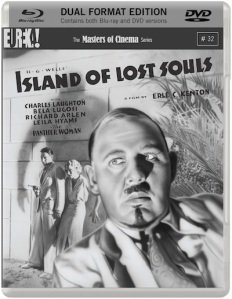 The first of two new Charles Laughton releases from Masters of Cinema in May, 1932’s
The first of two new Charles Laughton releases from Masters of Cinema in May, 1932’s  The second Laughton escapade is thankfully on the lighter side, as he heads from the safety of Paris to the Wild West in Leon McCarey’s 1935 comedy,
The second Laughton escapade is thankfully on the lighter side, as he heads from the safety of Paris to the Wild West in Leon McCarey’s 1935 comedy, 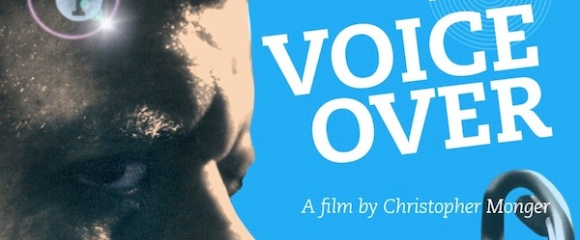
 Bemused by the opposite sex, Fats’ discovery of “Bitch” (Bish Nethercote) is never adequately explained, the viewer left to wonder if he did indeed find her post-attack or if he carried it out himself.
Bemused by the opposite sex, Fats’ discovery of “Bitch” (Bish Nethercote) is never adequately explained, the viewer left to wonder if he did indeed find her post-attack or if he carried it out himself.